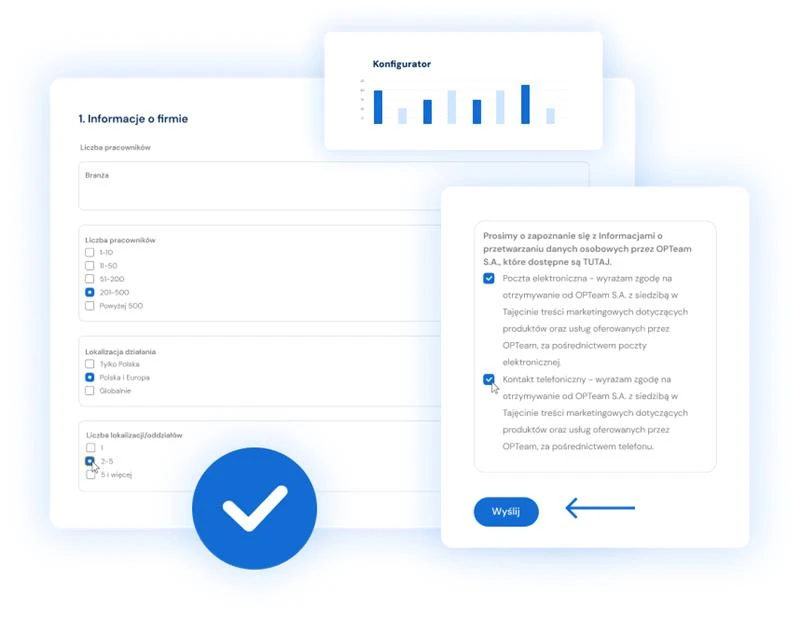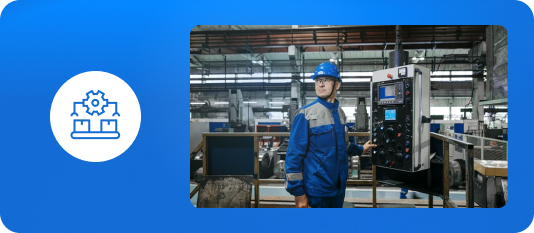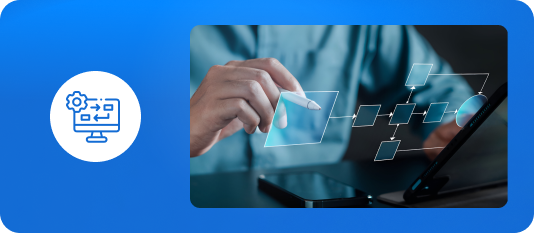ERP and BI systems
Automate processes to benefit your business
ERP (Enterprise Resource Planning) systems are a key technology supporting enterprise management. They revolutionize business processes across all areas of operation in companies of all sizes. Understanding the potential of these solutions, we offer clients comprehensive implementation services for the latest ERP systems available on the market, assisting with both the implementation of selected software and its maintenance and development.

Choose an ERP system that will help you manage your company effectively
Comarch ERP XL
An extensive system providing comprehensive support in managing all areas of the company.
MoreComarch ERP Optima
A functional system tailored to the needs of small and medium-sized enterprises from various industries.
MoreComarch Betterfly
A functional system for small and medium-sized enterprises and accounting offices.
MoreComarch BI Point
An analytical and reporting platform for acquiring and processing data to assess the performance of business processes.
MoreComarch Mobile
Applications supporting the implementation of key business processes in companies from anywhere, at any time.
MoreTeta ERP
A management system for companies, universities and institutions, supporting the functioning of the organization in all its areas.
MoreERP extensions
Applications dedicated to ERP systems that increase their functional scope by supporting additional processes.
More
Not sure which ERP system you need? Use the configurator
Go to the configurator and fill out the fields to receive a recommendation for the ERP system that best meets your company's business needs. Well-tailored software ensures smooth processes and efficient operations. Gain confidence and choose wisely so that the solution supports your company's growth. przedsiębiorstwa.
See the many benefits of a well-chosen and implemented ERP system
See how we work to help you achieve a competitive advantage
When you implement an ERP system with us, you receive not only a modern business management tool, but also the support of experienced experts who will help you fully utilize the system's potential. Each of our ERP packages differs in functionality and purpose, so we always carefully analyze client needs and implement solutions.
 Stage 1
Stage 1
 Stage 2
Stage 2
 Stage 3
Stage 3
 Stage 4
Stage 4
 Stage 5
Stage 5
 Stage 6
Stage 6
Effectively manage processes across all business areas
We help you implement an ERP system and integrate all business processes into a single, cohesive ecosystem to increase their efficiency and improve overall company performance. This allows your company to gain better control over resources, finances, production, customer relationships, and other areas of its business. You can easily analyze data from a wide variety of sources, enabling faster, more informed decision-making and rapid response to market changes

Management
Making sound decisions based on current data.
HR
Building team competencies and handling employee matters.
Finance
Budgeting, planning financial resources, and settlements.
Production
Improving production processes from planning to product receipt.
Logistics
Managing material flow and inventory.
Sales
Supporting commercial processes and building relationships with contractors.
We digitalize businesses across a wide range of industries
We have completed numerous ERP implementation projects for companies operating in various industries, providing us with the knowledge and expertise needed to successfully and efficiently implement any business management software.
Services
Support in order processing, time-based execution, and cost accounting.
Trade
Improving inventory, order, and delivery management processes, including sales management.
Industry
Support in order planning and execution, as well as material requirements management.
FMCG
Efficient supply chain management, warehouse management, production, and product sales.
Construction
Facilitate project planning and implementation, cost management, scheduling, and resource logistics.
Transportation
Improve logistics processes, fleet management, delivery scheduling, and cost accounting.
Accounting offices
Automation of full accounting processes, invoice settlement, and client documentation management.
Finance
Automation of budgeting, cost accounting, and reporting processes, as well as internal audits.
Healthcare
Simplifying personnel management processes, inventory management, and financial and HR documentation.
Articles
See the latest articles, expert advice, interviews, and reports related to the digitalization of processes and the latest technologies.
The choice of an ERP system impacts data integrity, process efficiency, and (...)
An ERP (Enterprise Resource Planning) system is a strategic tool that (...)

Frequently asked questions about ERP systems
Enterprise Resource Planning, or ERP for short, is software that integrates all company processes into a single IT environment. The solution is built from modules that reflect the company's structure and incorporate automation functionalities, thereby facilitating task execution.
ERP systems support the management of every company, regardless of its size or business profile. However, it's crucial to choose the right solution based on its functional scope. Smaller companies will therefore require standard functionalities, while large companies and corporations will require more advanced and comprehensive tools. Nevertheless, for every company, software scalability will be crucial, allowing it to adapt to changing and often growing business needs.
The time it takes to implement an ERP system is individual and depends on many factors. These include the scale of the company, its digitalization needs, and the number of processes to be automated. Furthermore, business plans, as the system should not hinder company growth. Therefore, for smaller companies, ERP system implementation can be completed within a quarter, but the project period typically ranges from 6 to 12 months. This is because implementation includes pre-implementation analysis, implementation, system configuration, testing and data migration, and finally, go-live and user training.
The cost of ERP depends on several factors, including the type of solution, the number of modules being implemented, the number of intended users, and the amount of work required – including implementation, configuration, integration, and data migration. Therefore, the cost of implementing an ERP system can only be accurately estimated after an initial consultation. The software purchasing model is also important, and can be either a traditional license or a subscription-based (SaaS) plan.
When choosing an ERP system, the most important criteria will be the company's size and business needs – areas requiring digital improvements. Due to the nature of the software, which covers the entire company's operations, proper fit is crucial. Only then will it fulfill its role and be a profitable investment. Therefore, it's a good idea to conduct internal research and compare available market tools, and ultimately consult with an expert or technology partner.
When choosing a technology partner, their experience in ERP system implementations is crucial. This is confirmed by customer references and partnerships with ERP software vendors. Furthermore, the range of services provided includes analysis, implementation, configuration, training, and maintenance, as well as an experienced implementation team.
There are many ERP systems available on the market, varying in functional scope and purchasing models. One of the most popular is software from Comarch, which offers several such solutions, such as Comarch ERP Optima for small businesses and Comarch ERP XL for large enterprises. Each is compliant with Polish regulations and has dedicated extensions. Another well-known manufacturer is Unit4, which offers systems from the Teta family, as well as Microsoft Dynamics and many other tools.
Want to know more? Contact us
Let us know your needs and expectations, and our consultant will contact you. Together, we'll choose the best solutions for your business.












